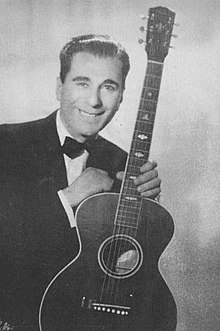Nick Lucas
 From Wikipedia the free encyclopedia
From Wikipedia the free encyclopedia
This article needs additional citations for verification. (January 2020) |
Nick Lucas | |
|---|---|
 | |
| Background information | |
| Birth name | Dominic Nicholas Anthony Lucanese |
| Born | August 22, 1897 Newark, New Jersey, U.S. |
| Died | July 28, 1982 (aged 84) Colorado Springs, Colorado, U.S. |
| Genres | Jazz, traditional pop |
| Occupation(s) | Musician, bandleader |
| Instrument(s) | Guitar, vocals |
| Years active | 1915–1981 |
| Labels | Pathé, Brunswick, Durium, Cavalier, Accent |
| Website | nicklucas |
Dominic Nicholas Anthony Lucanese (August 22, 1897 – July 28, 1982),[1] better known by his stage name Nick Lucas, was an American jazz singer and guitarist. He was the first jazz guitarist to record as a soloist. His popularity during his lifetime came from his reputation as a singer. His signature song was "Tiptoe Through the Tulips".
Career[edit]
Lucas was born on August 22, 1897 in Newark, New Jersey[2] to an Italian-American family.[1] In 1922, at the age of 25, he gained renown with his hit renditions of "Pickin' the Guitar" and "Teasin' the Frets" for Pathé. In 1923, Gibson Guitars proposed to build him a concert guitar with a deeper body. Known as the "Nick Lucas Special," it became a popular model with guitarists. It was the guitar's outline which was later used as the basis for the Gibson Les Paul solid body electric guitar. Also in 1923, he began recording for Brunswick and remained one of their exclusive artists until 1932.
In 1929, Lucas co-starred in the Warner Bros. two-color Technicolor musical, Gold Diggers of Broadway,[1] in which he introduced the two hit songs "Painting the Clouds with Sunshine" and "Tiptoe Through the Tulips", which survives in a fully synchronized and preserved Vitaphone disc. In the same year, Lucas was featured in the studio's all-star revue, The Show of Shows.[1] He turned down Warner Bros. seven-year contract offer, which went instead to fellow crooner Dick Powell.
In April 1930, Warner bought Brunswick and gave him his own orchestra, billed on his records as "The Crooning Troubadours". This arrangement lasted until December 1931, when Warner licensed Brunswick to the American Record Corporation (ARC). The new owners were not as extravagant as Warner Bros. had previously been and Lucas lost his orchestra and eventually left Brunswick in 1932. He made two recordings for Durium in 1932 for their Hit of the Week series. They were his last major recordings.
For the rest of his career Lucas performed on radio, in night clubs, and in dance halls.[1] He made a number of recordings for small or independent labels, including Cavalier where he was billed as the "Cavalier Troubadour." In 1944, he reprised some of his old hits in soundies movie musicals, and filmed another group of songs for Snader Telescriptions in 1951, including his hit of "Walkin' My Baby Back Home". He signed with Accent in 1955 staying with the label for 25 years.[3] He made an extended eight-month tour of Australia.
In 1974, his renditions of the songs, "I'm Gonna Charleston Back to Charleston", "When You and I Were Seventeen", and "Five Foot Two, Eyes of Blue" were featured on the soundtrack of The Great Gatsby (1974),[1] selected by the film's musical director Nelson Riddle. Lucas became friends with Tiny Tim, who considered him an inspiration and who borrowed "Tiptoe Through the Tulips" as his own theme song.[1] Lucas sang the song for Tiny Tim when he married Miss Vicki on The Tonight Show Starring Johnny Carson on December 17, 1969.
Lucas was married to his wife for 65 years; he died in Colorado Springs, Colorado[2] of double pneumonia at age 84.
Discography[edit]
- Painting the Clouds with Sunshine (Decca, 1957)[1]
- Tip-Toe Thru' The Tulips (ASV Living Era, 2000)
References[edit]
- ^ a b c d e f g h Colin Larkin, ed. (1992). The Guinness Encyclopedia of Popular Music (First ed.). Guinness Publishing. p. xx. ISBN 0-85112-939-0.
- ^ a b "Nick Lucas Biography, Songs, & Albums". AllMusic. Retrieved June 30, 2023.
- ^ Pitts, Michael; Hoffmann, Frank (December 22, 2001). The Rise of the Crooners. Scarecrow Press. pp. 155–. ISBN 978-1-4617-0712-7. Retrieved November 11, 2017.